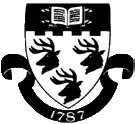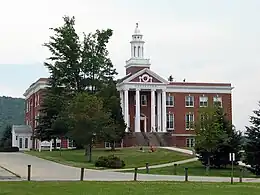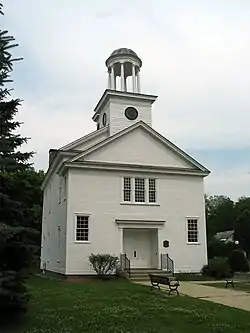 | |
Former names | Rutland County Grammar School (1787–1828) Vermont Classical High School (1828–1830) Castleton Seminary (1830–1876) State Normal School at Castleton (1867–1920) Castleton Normal School (1920–1947) Castleton Teachers College (1947–1962) Castleton State College (1962–2015) Castleton University (2015–2023)[1] |
|---|---|
| Type | Public university |
| Established | 1787 |
| Accreditation | NECHE |
Academic affiliations | Vermont State Colleges |
| Endowment | $7.86 million[2] |
| Chancellor | Sophie Zdatny |
| President | Mike Smith |
Academic staff | 80 |
Administrative staff | 200 |
| Students | 2,399 (2020)[3][4] |
| Undergraduates | 1,823 (2020)[3][4] |
| Postgraduates | 576 (2020)[3][4] |
| Location | , , U.S. 43°36′25″N 73°10′48″W / 43.607°N 73.180°W |
| Campus | Rural college town, 165 acres (67 ha) |
| Colors | Castleton green, dark gray and white[5] |
| Nickname | Spartans |
Sporting affiliations | NCAA Division III – Little East Conference |
| Mascot | Sparty |
Castleton University was a public university in Castleton, Vermont.
In July 2023, Castleton University ceased operations in a merger with Northern Vermont University, and Vermont Technical College. Upon Castleton's dissolution it was the 18th oldest university in the nation.
At the time of its closure, Castleton had an enrollment of 2000 students and offered more than 30 undergraduate programs, as well as master's degrees. It was accredited by the New England Commission of Higher Education.
History
Castleton University traced its history to the Rutland County Grammar School, chartered by the Vermont General Assembly on October 15, 1787.[6] The Grammar School was a regional school, preparing young men for college through instruction in traditional academic subjects such as Latin and Greek. The institution frequently changed its name during the 19th century. At various times it was known as Castleton Academy, Castleton Academy and Female Seminary, Vermont Classical High School (1828–1830), and Castleton Seminary (1830–1876).[7]
In 1823, instruction in "the solid branches of female education" began for "young Ladies and Misses". By the time of the Civil War, the majority of the students attending Castleton were young women.[8]
In 1829, a three-story brick building costing US$30,000 was constructed on a small hill south of the village. Principal Solomon Foot (1826–1829), who would go on to be President pro tempore of the U.S. Senate during the Civil War, was the driving force in this expansion of the school. The Seminary Building (eventually known as the Old Seminary Building) was the most impressive structure in the village, but expensive to maintain and often too large for the school's struggling enrollment.[9]
Castleton Medical College (1818–1862) was also located in the village. It graduated 1400 students, more than any other medical school in New England at the time. Although Castleton Medical College and Castleton Seminary were separate institutions, they often shared faculty. Today the former medical college building, known as the Old Chapel, is the oldest building on the campus.[10]
The first female principal was Harriet Newell Haskell (1862–1867). She had attended the Seminary as a child, took classes at Middlebury College without being permitted to matriculate, and then attended Mount Holyoke Female Seminary, which was not yet a college but offered a college-level curriculum for women. Although Haskell was in her 20s when she served as principal, the school flourished under her administration. With her departure to be principal of Monticello Ladies Seminary in Godfrey, Illinois, Castleton Seminary went into decline.[11]
The school began its transition from seminary to college in 1867, when the State Normal School at Castleton was founded as one of three state normal schools chartered by Vermont.[12]
Normal schools educated students for teaching careers. For 30 years the Normal School property and grounds were privately owned by Abel E. Leavenworth and his son Philip. In 1912, the State of Vermont purchased the property, and the name of the school changed slightly to Castleton Normal School in 1920.[13]
In the 1920s and 1930s, under the direction of Caroline S. Woodruff, the college experienced dramatic growth in students and its stature. Woodruff modernized the school's curriculum, incorporating the theories of Vermont educator-philosopher John Dewey, especially his precepts of "learning by doing" and "learning by teaching". She hired staff with advanced degrees, and broadened her students' exposure to the world by bringing people such as Helen Keller, Robert Frost, and Norman Rockwell to Castleton. Woodruff was the first and only Vermonter to become president of the National Education Association.[14]
In 1947, the Normal School became Castleton Teachers College. With increased enrollment from men, intercollegiate athletics began in the 1950s.[6]
In 1962, the institution became Castleton State College when it joined other state-supported colleges in becoming a part of the Vermont State Colleges, a consortium of colleges governed by a common board of trustees, chancellor, and Council of Presidents, each college having its own president and deans.[15]
In 1979, the board of trustees proposed a name change to Southern Vermont State College; the proposal was never acted on.[16] On July 23, 2015, the Vermont State Colleges Board of Trustees voted unanimously to change the name of the institution to Castleton University.[17]
Nearby Rutland plays host to the Castleton Polling Institute, as well as a professional development center for educators and entrepreneurs. In September 2016, the university opened Foley Hall, a two-floor residence, in collaboration with Green Mountain Power and Efficiency Vermont that provides housing for students.[18] Castleton extended its reach into Bennington County in 2019, when it began a partnership with Southwestern Vermont Medical Center in Bennington to host its B.S. registered nurse program after the closure of Southern Vermont College that year. Castleton collaborates with Vermont Technical College in the nursing program, whose offices are housed in the Bjur Building (otherwise known as the Vermont Mill).[19]
 Woodruff Hall
Woodruff Hall Built in 1821, Old Chapel (Castleton Medical College Building) is the oldest building on the Castleton campus.
Built in 1821, Old Chapel (Castleton Medical College Building) is the oldest building on the Castleton campus.
Castleton Polling Institute
In 2012, Castleton began the Castleton Polling Institute with an initial investment of $100,000. The first poll was conducted from February 11 to February 22, 2012, and polled Vermont voters about the 2012 Presidential Primaries.[20][21] Since the first poll, the Polling Institute has conducted over 30 public opinion and public policy polls for state agencies, non-profits, and media organizations. The institute's founding director, Rich Clark, is a professor of political science and had been working in academia and polling for 15 years before coming to Castleton in 2011 from the University of Georgia.[22]
Athletics
The Castleton Spartans compete in 28 NCAA Division III varsity sports (14 men's 14 women's).
Notable alumni
- Chad Bentz, baseball player
- Arthur P. Carpenter, US Marshal for Vermont[23][24]
- William Carris, Vermont State Senator
- Barbara Crampton, actress
- Robby Kelley, Former U.S. Ski Team Member
- Kevin J. Mullin, member of the Vermont House of Representatives and Vermont Senate[25]
- Hester Martha Poole (1833/34–1932), writer, artist, advocate
- Scott La Rock, musician
- Jarrod Sammis, Vermont state representative[26]
- Twiddle, jam band
See also
References
- ↑ "Castleton Accreditation Documents: Castleton University Self-Study Report 2021". www.castleton.edu. Castleton University. Retrieved 23 December 2023.
- ↑ As of December 31, 2015. "2015 Performance Indicators Executive Summary" (PDF). VSC. Archived from the original (PDF) on 2016-10-10.
- 1 2 3 "Quick Facts".
- 1 2 3 "Castleton University | Data USA".
- ↑ "Colors". Castleton University. Retrieved 2016-09-26.
- 1 2 "A Brief History of Castleton". Castleton State College. 2010. Retrieved 2017-04-25.
- ↑ Peffer 2012, pp. 317–318.
- ↑ Peffer 2012, pp. 20, 42.
- ↑ Peffer 2012, pp. 21–25.
- ↑ Waite, Frederick Clayton. The First Medical College in Vermont: Castleton 1818–1862. Vermont Historical Society (1949).
- ↑ Peffer 2012, pp. 36–45.
- ↑ "About the College - Castleton State College - Acalog ACMS™". catalog.castleton.edu. Retrieved 2017-09-11.
- ↑ John Duffy; Samuel H; Ralph Orth, eds. (2003). The Vermont Encyclopedia. Burlington, Vt.: University Press of New England. p. 78. ISBN 9781584650867.
- ↑ "Undergraduate Catalog 2011–12" (PDF). Castleton State College. 2011. p. 5. Retrieved 2017-04-25.
- ↑ Vermont State Colleges Manual of Policies and Procedures, Section A: Statute and By-Laws. Vermont State Colleges (2003). pgs. 4, 21.
- ↑ Peffer 2012, pp. 238–239.
- ↑ Crawford, Logan (July 23, 2015). "CSC becomes Castleton University". WCAX. Burlington, Vt. Archived from the original on July 24, 2015. Retrieved 2015-07-24.
- ↑ "Foley Hall Opens in Downtown Rutland". Castleton Magazine. Castleton University. 2016. Retrieved January 7, 2017.
- ↑ Therrien, Jim (May 7, 2019). "Castleton University establishing site in Bennington". Bennington Banner. Retrieved March 27, 2020.
- ↑ Heintz, Paul (March 12, 2014). "Will a New Polling Institute Put Castleton State College on the Map?". Seven Days. Burlington, Vt. Retrieved March 12, 2014.
- ↑ "Vermont Voters & the 2012 Presidential Primaries". Castleton State College. 2012. Retrieved Feb 22, 2016.
- ↑ Wolk, Dave (May 29, 2012). "Vermonters Say …". New England Journal of Higher Education. Retrieved Feb 24, 2016.
- ↑ Carleton, Hiram (1903). Genealogical and Family History of the State of Vermont. Vol. II. New York, NY: Lewis Publishing Company. p. 105 – via Internet Archive.
- ↑ "Brattleboro Judge Dead at Age of 70". The Boston Globe. Boston, MA. October 23, 1937. p. 6 – via Newspapers.com.
- ↑ Secretary of the Vermont Senate (2017). "Biography, Kevin J. Mullin". Vermont State Senators, 2017-2018. Montpelier, VT: Vermont General Assembly.
- ↑ "Representative Jarrod Sammis". Vermont General Assembly. Retrieved 2023-05-11.
Further reading
- Peffer, Tony, ed. (2012). Big Heart: The Journey to Castleton's Two Hundred and Twenty-Fifth Birthday. Castleton, Vt.: Castleton State College.